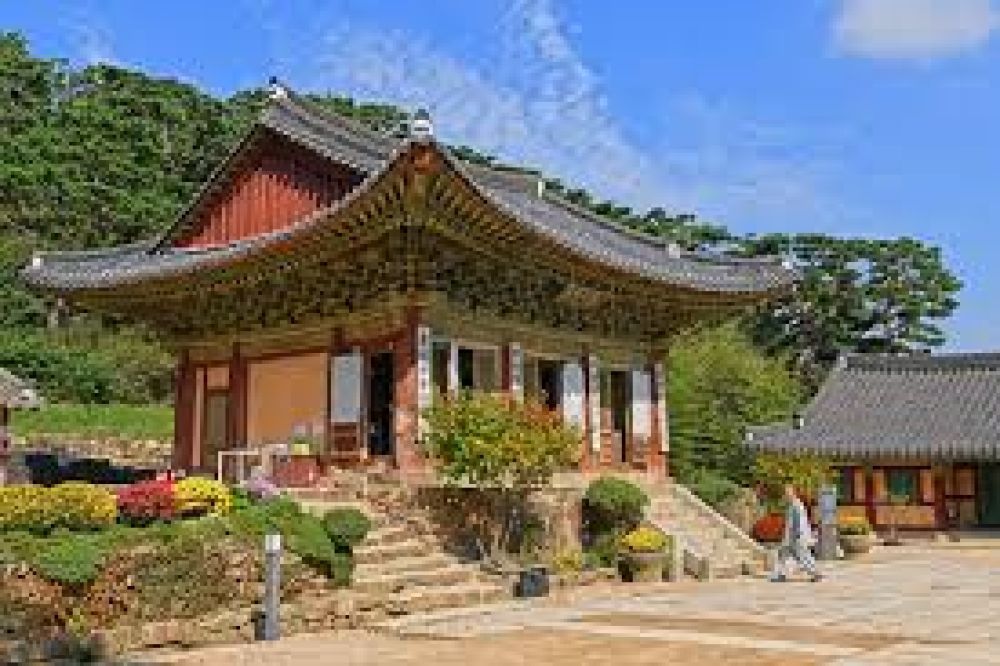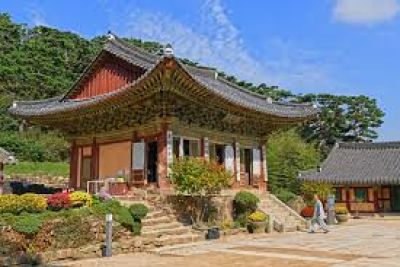

Embark on a spiritual journey and experience Korean Buddhist culture with a temple stay at Jeondeungsa Temple. This program offers participants an opportunity to live alongside monks and nuns, participating in their daily routine. Activities might include meditation, a tea ceremony, and Seon (Zen) practice. The program usually involves an overnight stay within the temple grounds, where guests stay in simple and traditional accommodations. During this time, visitors get to reflect on themselves and experience tranquility away from the hustle and bustle of city life. It is a time for quiet contemplation and learning about Buddhist principles and Korean cultural practices. The temple stay might also include a tour of the temple grounds, dharma talks where monks discuss Buddhist teachings, and communal work periods helping with simple tasks around the temple.
Jeondeungsa Temple, home to more than a thousand years of history, offers guided tours for those interested in learning more about its rich heritage. Through the guided heritage tour, visitors can delve into the temple's past, exploring its ancient architecture and artifacts. A knowledgeable guide explains the significance of various halls, such as the main Daeungbojeon Hall, recognized for its intricate woodwork and stunning examples of Joseon Dynasty craftsmanship. Visitors will see the famous 'Gwaneum bodhisattva' and 'Sakyamuni triad' and learn the stories behind them. These tours often include a visit to the temple's museum, which houses a collection of Buddhist relics, paintings, and cultural assets. The tour provides a comprehensive understanding of the religious and historical value of Jeondeungsa Temple, making it a worthwhile activity for history enthusiasts and the spiritually curious alike.
Jeondeungsa Temple offers a lotus lantern making workshop that provides a chance to engage with Buddhist culture through traditional craft. During the workshop, participants craft their own lotus lanterns, a symbol of enlightenment in Buddhism. This hands-on activity is both relaxing and culturally immersive, as one shapes colorful paper and wires into beautiful lanterns guided by temple volunteers. It is an activity suitable for families and individuals alike, offering a creative break and a piece of Korean culture to take home. Plus, the workshop serves as a wonderful precursor to the annual Lotus Lantern Festival - Yeondeunghoe - where these lanterns are displayed. By participating, visitors learn about the cultural significance behind the lanterns and the festivals, gain insight into Buddhist practices, and have an enriching personal experience at the same time.
A deeply spiritual activity, the 108 Prostrations ritual at Jeondeungsa Temple, allows participants to perform a series of 108 bows. This practice is a physical and meditative exercise intended for repentance, humility, and reflection upon one's life. It can be a transformative experience, as it is often intended to cast away 108 defilements, which are considered in Buddhism as sources of suffering. The temple provides an opportunity for visitors to participate in the prostrations within the temple's serene surroundings, promoting mental clarity and spiritual well-being. This ritual is sometimes accompanied by chanting and traditional music, adding to the immersive experience. The 108 Prostrations are a common practice in Korean temples and can be performed by people of all ages and backgrounds, with guidance provided for beginners.
Jeondeungsa offers visitors the unique experience of participating in traditional Buddhist ceremonies. These ceremonies can range from daily services, where monks chant sutras and offer prayers, to significant annual rituals that coincide with major Buddhist holidays. Taking part in a ceremony provides an up-close view of Buddhist worship practices and the monastic community's devotion. Attendees are often struck by the solemnity and beauty of the chants, drumming, and rituals performed during these ceremonies. Visitors are generally expected to observe respectfully and are sometimes allowed to follow along with certain chants or offerings. Engaging in this activity not just serves as a cultural learning experience but also offers a moment of peace and spiritual reflection.
The beautiful and extensive grounds of Jeondeungsa Temple are a perfect setting for tranquil nature walks. Visitors can enjoy the lush greenery, magnificent trees, and the general peace that comes with being in a space that has been considered sacred for centuries. These self-guided walks allow you to explore at your own pace, take in the fresh air, and perhaps enjoy a picnic in designated areas. Along the way, you might encounter wandering monks, ancient stupas, and carved stone lanterns, all while getting a glimpse of the local wildlife. Nature walks at Jeondeungsa are an ideal way to combine physical exercise with spiritual nourishment, suitable for visitors of all ages.
Jeondeungsa Temple offers mindfulness meditation sessions for individuals seeking mental calm and clarity. These sessions usually take place in a serene environment and are led by experienced practitioners. The meditation practice focuses on deep breathing and being present, which is reinforced by the tranquil atmosphere of the temple surroundings. Beginners and those with a regular practice can both benefit from these sessions. Participating can relieve stress, enhance self-awareness, and contribute to a greater sense of peace, making it an attractive activity for those looking to escape the stresses of daily life. Whether you are looking to deepen your spiritual practice or simply find a moment of tranquility, these meditation sessions are a valuable experience.
At Jeondeungsa Temple, visitors can participate in a traditional tea experience. This activity is not just about drinking tea; it is viewed as a spiritual practice in itself, promoting mindfulness, respect, and harmony. The ceremony includes the preparation and presentation of traditional Korean teas, along with explanations of their significance in Buddhist philosophy. Participants learn the proper etiquette for tea drinking and gain an understanding of how this simple beverage can serve as a means for meditation and social communion. Surrounded by the temple's ancient and peaceful environment, this activity is both culturally enriching and personally restorative, providing a quiet respite from the outside world and a taste of monastic tranquility.
Jeondeungsa Temple provides a unique culinary experience with its temple food cooking class, where participants learn to prepare traditional Korean Buddhist cuisine. This food is plant-based, aligning with Buddhist precepts of non-violence, and incorporates seasonal ingredients with a focus on balance and natural flavors. Under the guidance of temple cooks, you prepare a variety of dishes using traditional methods, creating a meal that is not only delicious but also spiritually meaningful. These cooking classes are an enlightening way to engage with Korean culture, offering insights into how food is part of Buddhist practice, as well as the benefits of a mindful approach to eating. After the class, participants get to enjoy the food they've prepared in a communal setting, further embodying the communal and meditative aspects of temple life.
The Jeondeungsa Temple offers a Cultural Experience Program which is designed to provide an immersive introduction to the practices and lifestyle of Korean Buddhism. Throughout the program, participants partake in a variety of activities, which might include making prayer beads, traditional crafts, or even performing a temple etiquette workshop. The Cultural Experience Program is an excellent choice for those looking to understand and appreciate the depth of Korean culture. It serves as both an educational and personal growth experience, as each activity is designed to inspire mindfulness and cultural appreciation. This interactive and engaging program is suitable for visitors of all ages and can be particularly rewarding for those interested in deepening their knowledge of Korean traditions and Buddhist philosophy.
